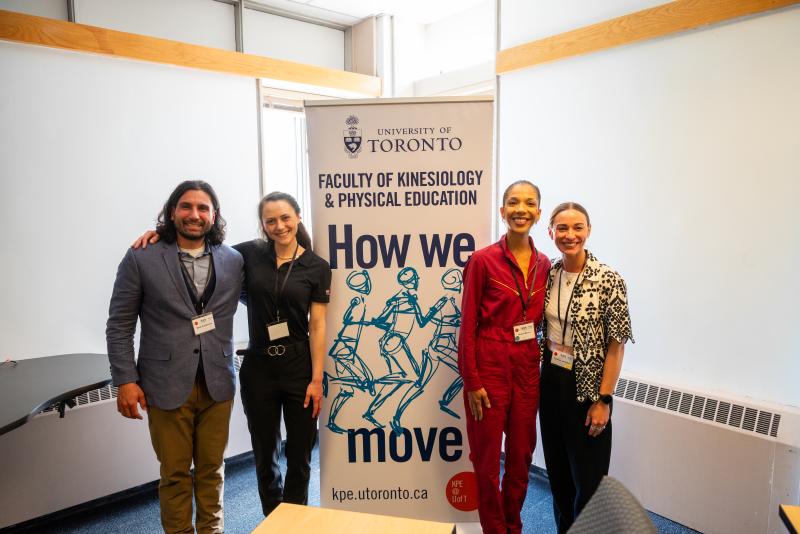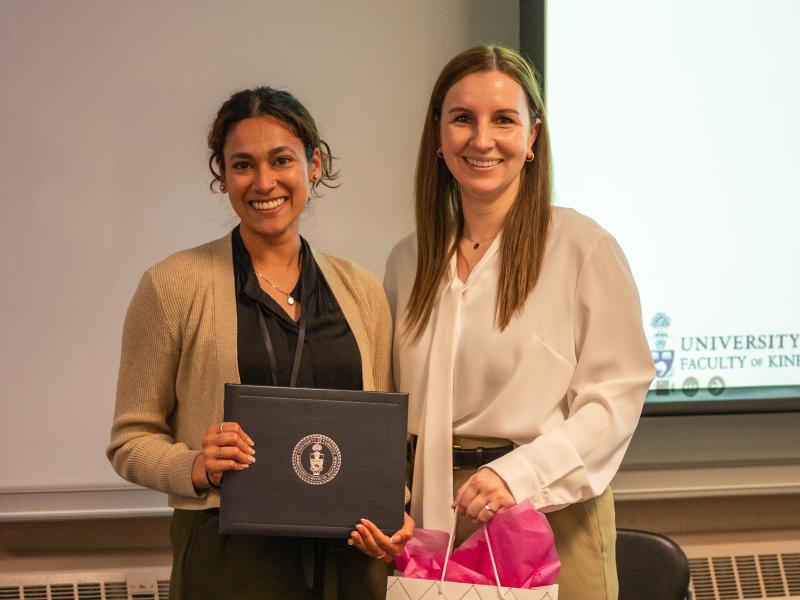On May 9, 2025, the Kinesiology and Physical Education Graduate Society (KPEGS) held its annual Bodies of Knowledge (BoK) conference. Students from twelve universities across Canada gathered in the Athletic Centre for a busy day of presentations and panels that shone a light on the diversity of graduate research taking place in the field.
KPE professor Catherine Sabiston opened the proceedings with welcome remarks that emphasized the Faculty’s mission to lead in the creation and dissemination of knowledge that enhances health and well-being through physical activity. “This gathering celebrates bold thinking, rigorous scholarship, and a deep commitment to advancing the fields of physical activity, health, and human performance,” she said. “The presentations that are planned for today reflect the interdisciplinary nature of our work, ranging from cell to society.” She encouraged conference participants to ask questions, make connections and embrace the conversations that challenged and inspired them.
“I am inspired by my peers every single day and it brings me a deep sense of gratitude and satisfaction to be able to give back to my community and Faculty,” said second-year PhD student Alia Mazhar, one of the conference’s co-chairs and organizers. “Research can sometimes feel isolating so curating a day where we can facilitate connection and furthering a sense of community was very meaningful for me.”
Throughout the day, students gave more than forty presentations that covered topics like concussion recovery, cardiovascular adaptation, elite athlete body image, psychological safety in sport, and the broader societal concerns of physical activity—like the effects of wildfires, decolonized hockey rinks, stadium foodscapes and NHL draft politics.

For Mazhar, however, the highlight of the event was the morning’s keynote panel, “Careers Beyond Academia,” moderated by Tanenbaum Institute for Sport Science senior research associate Kathryn Johnston. The panel included MLSE Director of Research & Strategy Marika Warner, Canadian Sport Institute Ontario’s Christine Camozzi, and Dr. Nima Dehghansai, Athlete Development and Talent ID Specialist at Paralympics Australia. Their talk highlighted the diverse career paths available to kinesiology graduates, as well as the many ways that academic expertise can be applied beyond a university setting, and was followed by a lively Q&A session.
“I was so excited to see the calibre of questions asked during the panel and the networking that took place afterwards,” said Mazhar. “I hope that students were inspired and had the opportunity to make meaningful connections that transpire into future opportunities for them!”

For fourth-year PhD student Aalaya Milne, of KPE, BoK was an opportunity to present meaningful research from her recent studies. She gave a presentation entitled “‘It was the only thing that made me feel like me’: Growth following adversity in dance,” saying that she was motivated to expand her knowledge of the field of safe sport into the dance world; her talk earned her the Best Oral Presentation award, presented by Vice Dean of Programs Ashley Stirling at the day’s end. “I’m so honoured to be recognized in this way,” she said. “I was amazed to be selected from among the innovative and diverse research being produced within the field.” Like her peers, Milne highlighted the many ways in which the field of kinesiology is growing and changing as sociocultural perceptions of sport continue to evolve.
All told, Mazhar considers BoK 2025 to be a resounding success. “Based on the diversity and depth of research, it’s clear that we are attracting the scholars of tomorrow and putting KPE on the map,” she said.
